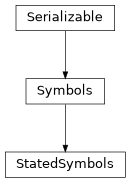Symbols¶

Communication symbols represent a stream of complex-valued symbols that are processed during coherent communication.
- class Symbols(symbols=None)[source]¶
Bases:
SerializableA time-series of communication symbols located somewhere on the complex plane.
- Parameters:
symbols (
Union[Iterable,ndarray,None]) – A three-dimensional array of complex-valued communication symbols. The first dimension denotes the number of streams, the second dimension the number of symbol blocks per stream, the third dimension the number of symbols per block.
- classmethod Deserialize(process)[source]¶
Deserialize an object’s state.
Objects cannot be deserialized directly, instead a
Factorymust be instructed to carry out the deserialization process.- Parameters:
process (
DeserializationProcess) – The current stage of the deserialization process. This object is generated by theFactoryand provides an interface to deserialization methods supporting multiple backends.- Return type:
- Returns:
The deserialized object.
- append_stream(symbols)[source]¶
Append a new symbol stream to this symbol seris.
Represents a matrix concatenation in the first dimensions.
- Parameters:
symbols (
Symbols|ndarray) – Symbol stream to be appended to this symbol series.- Raises:
ValueError – If the number of symbols in time-domain do not match.
- Return type:
- append_symbols(symbols)[source]¶
Append a new symbol sequence to this symbol seris.
Represents a matrix concatenation in the second dimensions.
- Parameters:
symbols (
Symbols|ndarray) – Symbol sequence to be appended to this symbol series.- Raises:
ValueError – If the number of symbol streams do not match.
- Return type:
- serialize(process)[source]¶
Serialize this object’s state.
Objects cannot be serialized directly, instead a
Factorymust be instructed to carry out the serialization process.- Parameters:
process (
SerializationProcess) – The current stage of the serialization process. This object is generated by theFactoryand provides an interface to serialization methods supporting multiple backends.- Return type:
- property plot_constellation: _ConstellationPlot¶
Plot the symbol constellation.
- class StatedSymbols(symbols, states)[source]¶
Bases:
SymbolsA time-series of communication symbols and channel states located somewhere on the complex plane.
- Parameters:
symbols (
Union[Iterable,ndarray]) – A three-dimensional array of complex-valued communication symbols. The first dimension denotes the number of streams, the second dimension the number of symbol blocks per stream, the the dimension the number of symbols per block.states (
ndarray|SparseArray) – Four-dimensional numpy array with the first two dimensions indicating the MIMO receive and transmit streams, respectively and the last two dimensions indicating the number of symbol blocks and symbols per block.
- classmethod Deserialize(process)[source]¶
Deserialize an object’s state.
Objects cannot be deserialized directly, instead a
Factorymust be instructed to carry out the deserialization process.- Parameters:
process (
DeserializationProcess) – The current stage of the deserialization process. This object is generated by theFactoryand provides an interface to deserialization methods supporting multiple backends.- Return type:
- Returns:
The deserialized object.
- dense_states()[source]¶
Return the channel state in dense format.
Note that this method will convert the channel state to dense format if it is currently in sparse format. This operation may be computationally expensive and should be avoided if possible.
Returns: The channel state tensor in dense format.
- Return type:
- serialize(process)[source]¶
Serialize this object’s state.
Objects cannot be serialized directly, instead a
Factorymust be instructed to carry out the serialization process.- Parameters:
process (
SerializationProcess) – The current stage of the serialization process. This object is generated by theFactoryand provides an interface to serialization methods supporting multiple backends.- Return type:
- property states: ndarray | SparseArray¶
Symbol state information.
Four-dimensional numpy array with the first two dimensions indicating the MIMO receive and transmit streams, respectively and the last two dimensions indicating the number of symbol blocks and symbols per block.
- Raises:
ValueError – If the state array is not four-dimensional.
ValueError – If the state dimensions don’t match the symbol dimensions.
- class _ConstellationPlot(symbols)[source]¶
Bases:
VisualizableAttribute[ScatterVisualization]Plot the symbol constellation.
Essentially projects the time-series of symbols onto a single complex plane.
- Parameters:
axes – The axes to plot the graph to. By default, a new matplotlib figure is created.
title – Plot title. Only relevant if no axes were provided.
symbols (
Symbols) – The symbols to be plotted.
- Returns:
Handle to the created matplotlib.pyplot figure object. None if the axes were provided.